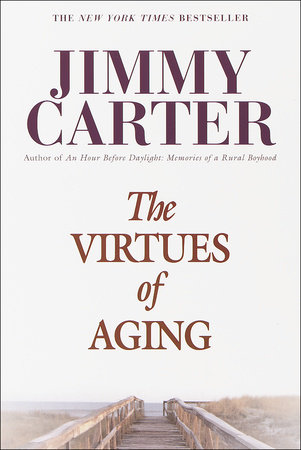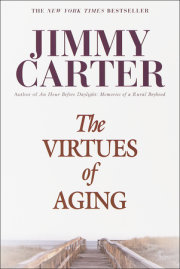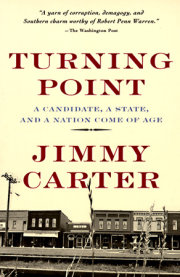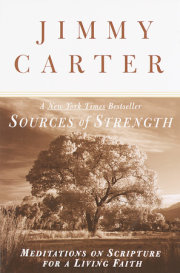Even before leaving the White House, Rosalynn and I received a notice from the American Association of Retired Persons that we were qualified for membership, but we considered ourselves too young to face the stigma of senior citizenship. However, once back in Plains the point was to be driven home most firmly and clearly. We live 120 miles south of Atlanta and habitually drive back and forth to The Carter Center and to Emory University, where I am a professor. One morning we left our house quite early and stopped to eat breakfast in Thomaston, Georgia, about halfway to Atlanta. There were four of us in the car, and we all ordered about the same thing. But when the waitress brought my bill, I noticed that it was less than the others. Perhaps seeking credit for being an honest customer, I called her back and began to tell her that she had made a mistake. An older farmer, dressed in overalls, was sitting at a nearby table and apparently overheard my conversation. He looked over at us and called out in a
loud voice, "Your bill ain't no mistake, Mr. President. Before eight o'clock they give free coffee to senior citizens."
A wave of laughter began at our table, and it still resonated through the restaurant as I paid my bill and hurried back to the car. For several weeks afterward, every time we approached Thomaston I knew that someone would say, "Why don't we stop here for breakfast? There's free coffee for some of us!"
In the years since returning home, Rosalynn and I have been through some severe tests and have struggled to find the best way to retain our self-confidence, evolve and interesting and challenging life, and build better relations with other people. As we've grown older the results have been surprisingly good.
The first time I fully realized how much our lives had changed was when I approached my seventieth birthday. In one of her hourlong special interviews, Barbara Walters covered all the aspects of my life, from the farm to submarienes, from business to the governor's mansion, service in the White House, and from president back home to Plains. Then she asked me a question that required some serious thought: "Mr. President, you have had a number of exciting and challenging careers. What have been your best years?" After a few moments I responded with absolute certainty: "
Now is the best time of all." She was surprised, and asked, "Why?"
I fumbled with some thoughts about time for reflection, spending more time with my family, and a chance to correct some of my former errors. Afterward I realized how inadequate my glib, thirty-second answer had been, and I discussed with Rosalynn how profoundly different--and pleasant--was the reality of our senior years.
This book is my expanded attempt, based on our personal experiences, to answer that question--to describe, in effect, the virtues of aging.
We are not alone in our worry about both the physical aspects of aging and the prejudice that exists toward the elderly, which is similar to racism or sexism. What makes it different is that the prejudice also exists among those of us who are either within this group or rapidly approaching it. When I mentioned the title of this book to a few people, most of them responded, "Virtues? What could possibly be good about growing old?" The most obvious answer, of course, is to consider the
alternative to aging. But there are plenty of other good answers--many based on our personal experiences and observations.
It is clear that in some ways Rosalynn and I are not typical, having been the First Family of a great nation, a special status that cuts both ways, with benefits
and liabilities. But in almost every aspect of life, our challenges have been similar to those of tens of millions of families who face the later years with a mixture of problems and opportunities, doublts and anticipation, despair and hope. We've had to address a common question: How could we ensure that our retired years would be happy, and maybe even productive?
. All rights reserved. No part of this excerpt may be reproduced or reprinted without permission in writing from the publisher.






